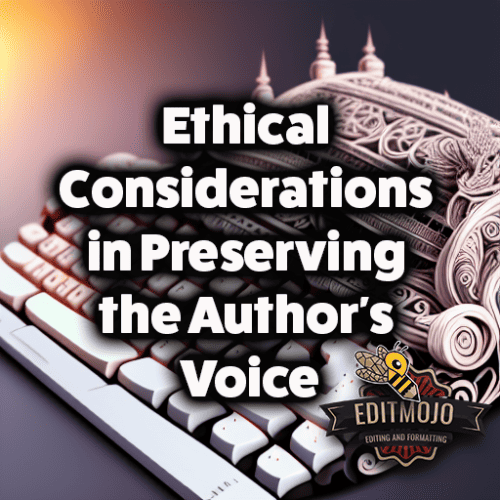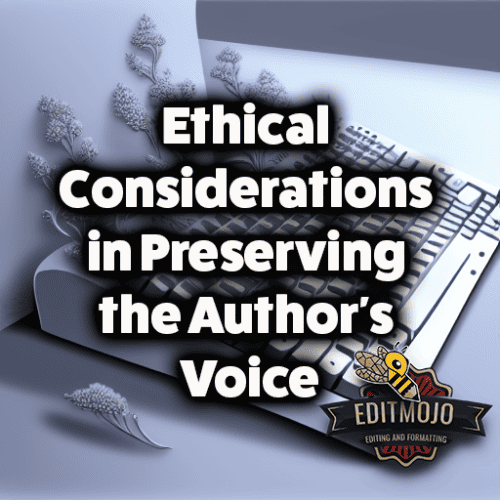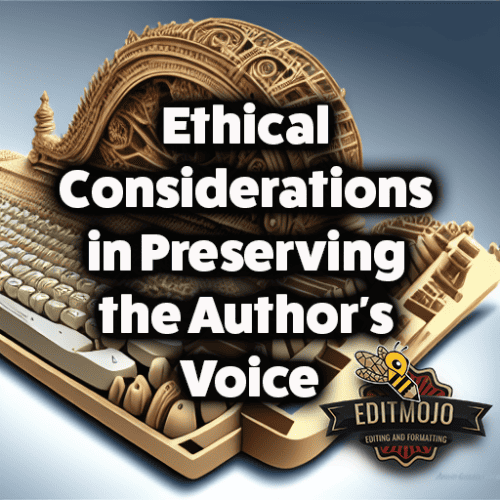Ethical considerations in preserving author’s voice
Ethical considerations in preserving author’s voice. Writing is an art, a means of expression and a reflection of the inner workings of an author’s mind. Central to this process is the author’s voice—a distinct amalgamation of tone, style, and worldview that is as unique to an author as their fingerprint. However, in our quest for mass appeal, commercial success, or even simplification, we sometimes inadvertently dilute, alter, or outright ignore this critical element. This article explores the ethical considerations surrounding the preservation of an author’s voice.
Key Takeaway Table
| Key Points | Details |
|---|---|
| Understanding the Author’s Voice | The author’s voice is a combination of syntax, diction, punctuation, character development, and dialogue that is unique to each author. |
| Ethical Principles in Literature and Writing | Ethical considerations in literature include plagiarism, bias, and preserving the authenticity of an author’s voice. |
| Ethical Dilemmas in Preserving the Author’s Voice | Balancing the preservation of an author’s voice and the market or editor’s vision is a major ethical challenge. |
| Rights of the Author | Authors have legal rights to their work and any alteration or distortion of it can violate these rights. |
| Role of Technology | While technology can help authors maintain their voice, AI and machine translations can sometimes fail to capture its nuances. |
| Preservation Guidelines | Clear communication and respect for the author’s voice from all involved in the writing, editing, and publishing process is key. |
| Consequences of Not Preserving the Author’s Voice | Not preserving an author’s voice can affect the work’s originality, the author’s reputation, reader’s perception, and even lead to legal implications. |
| Case Studies | Success in preserving the author’s voice can enhance a work’s reception, while failure can lead to misinterpretation and loss of original essence. |
Understanding the Author’s Voice
The author’s voice is a critical element of their literary persona. This “voice” is the individual writing style of an author, a combination of their common usage of syntax, diction, punctuation, character development, dialogue, etc. Each author’s voice is unique and it differentiates their work from that of others.
Let’s look at Ernest Hemingway, for example. Known for his terse, stripped-down prose and straightforward dialogue—a style imitated by many but duplicated by none—Hemingway’s voice is immediately recognizable. His novel, The Old Man and the Sea, exemplifies his voice: “He was an old man who fished alone in a skiff in the Gulf Stream and he had gone eighty-four days now without taking a fish.” It’s an image sculpted in simplicity, and it’s vintage Hemingway.
Ethical Principles in Literature and Writing
Ethics in literature and writing broadly concerns moral principles that govern a person’s behaviour or the conducting of an activity in literary and writing scenarios. These ethics come into play in various aspects like plagiarism, biases, and most importantly, the authenticity of an author’s voice.
Take plagiarism, for instance. Using another author’s voice without due credit is an obvious violation of these principles. But so is diluting or altering an author’s voice for any reason, which is an often-overlooked ethical consideration.

Ethical Dilemmas in Preserving the Author’s Voice
Preserving the author’s voice presents several ethical dilemmas. Chief among these is the balance between preserving the author’s voice and catering to the market or the editor’s vision for the book. For example, J.K. Rowling, renowned for her ‘Harry Potter’ series, faced challenges with her publishers who initially suggested toning down the more complex language to suit younger readers. However, Rowling’s insistence on preserving her voice resulted in a series that did not patronize its young audience and was also loved by adults worldwide.
The Rights of the Author and the Ethics of Voice Preservation
The preservation of an author’s voice is closely tied to the author’s moral and legal rights. The Berne Convention, for instance, grants authors the exclusive right to claim authorship of their work and to object to any distortion, modification, or other derogatory action concerning their work, which would be prejudicial to their honor or reputation.
Ghostwriting and co-authoring present potential ethical conflicts. If a ghostwriter is employed to mimic an author’s voice, it raises questions about authenticity. The key here is transparency—readers have a right to know when a work is a product of ghostwriting, especially if the author’s voice they are familiar with is not genuinely represented.
Role of Technology in Preserving or Compromising Author’s Voice
Technology—particularly digital publishing and AI—can both preserve and compromise the author’s voice. On one hand, digital self-publishing platforms give authors more control over their work, helping them to maintain their voice. However, AI and machine translation can fail to capture the nuances of an author’s voice, potentially leading to a homogenization of voices, reducing the richness and diversity of literature.

Guidelines for Ethically Preserving the Author’s Voice
Preserving the author’s voice requires effort from all involved in the writing, editing, and publishing process. Here are a few guidelines:
- Authors: Be clear about your vision for your work and your unwillingness to compromise your voice.
- Editors: Understand and respect the author’s voice. Your role is to polish and refine the work, not to alter its essence.
- Publishers: Remember that an author’s unique voice can be a selling point. Don’t dilute it for short-term gains.
The golden rule is always to communicate—dialogue between authors, editors, and publishers is critical in preserving the author’s voice.
Consequences of Not Preserving the Author’s Voice
When an author’s voice is not preserved, the authenticity and originality of the work can suffer. It might also impact the author’s reputation and the reader’s perception of their work. In the worst cases, it can even lead to legal implications, particularly if the author’s moral rights are infringed.
Case Studies: Successes and Failures in Preserving the Author’s Voice
When George Orwell’s 1984 was translated into other languages, some translators opted to replace Orwell’s characteristic plain English with more sophisticated language. This altered the author’s voice and dampened the book’s starkness. Contrast this with the success of Gabriel García Márquez, who worked closely with his translator, Gregory Rabassa, to ensure that the English version of One Hundred Years of Solitude preserved his unique narrative voice. Márquez even famously commented that the English translation was better than his original Spanish version!

Conclusion (Ethical considerations in preserving author’s voice)
The author’s voice is an invaluable component of their literary work and plays a crucial role in how the reader engages with it. Preserving this voice isn’t just about legal rights—it’s about respecting the author’s creative process and their readers’ expectations. As readers, we fall in love not just with stories, but with the voices telling them. As such, the preservation of these voices is an ethical imperative we should all strive to uphold.
In a world that’s increasingly automated, let’s remember that literature is human, and so are the voices behind it. It’s this human touch that makes a story compelling, a book unforgettable, and an author’s voice, irreplaceable.
Top Five Questions and Answers Table
| Questions | Answers |
|---|---|
| What is the ‘author’s voice’? | The author’s voice is a unique combination of syntax, diction, punctuation, character development, and dialogue that distinguishes one author’s work from another’s. |
| Why is it important to preserve the author’s voice? | Preserving the author’s voice maintains the authenticity and originality of the work, respects the author’s creative process, and meets the reader’s expectations. |
| What are some ethical dilemmas in preserving the author’s voice? | Some dilemmas include balancing the author’s voice with the market demand or the editor’s vision, and the temptation to alter the voice for commercial appeal. |
| How does technology impact the preservation of an author’s voice? | While digital publishing can give authors more control over their work, AI and machine translations can sometimes fail to capture the nuances of an author’s voice, leading to its homogenization. |
| What are the consequences of not preserving the author’s voice? | Not preserving the author’s voice can affect the work’s authenticity and originality, damage the author’s reputation, mislead the reader, and lead to legal implications. |
